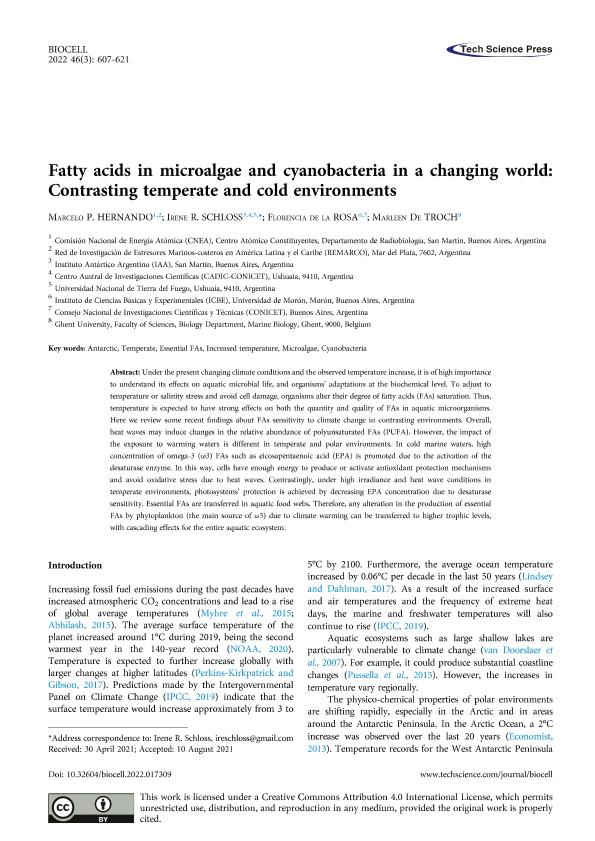Mostrar el registro sencillo del ítem
dc.contributor.author
Hernando, Marcelo Pablo

dc.contributor.author
Schloss, Irene Ruth

dc.contributor.author
de la Rosa, Florencia Grisel

dc.contributor.author
de Troch, Marleen
dc.date.available
2022-08-25T10:22:01Z
dc.date.issued
2021-11
dc.identifier.citation
Hernando, Marcelo Pablo; Schloss, Irene Ruth; de la Rosa, Florencia Grisel; de Troch, Marleen; Fatty acids in microalgae and cyanobacteria in a changing world: Contrasting temperate and cold environments; Tech Science Press; Biocell; 46; 3; 11-2021; 607-621
dc.identifier.issn
0327-9545
dc.identifier.uri
http://hdl.handle.net/11336/166544
dc.description.abstract
Under the present changing climate conditions and the observed temperature increase, it is of high importance to understand its effects on aquatic microbial life, and organisms’ adaptations at the biochemical level. To adjust to temperature or salinity stress and avoid cell damage, organisms alter their degree of fatty acids (FAs) saturation. Thus, temperature is expected to have strong effects on both the quantity and quality of FAs in aquatic microorganisms. Here we review some recent findings about FAs sensitivity to climate change in contrasting environments. Overall, heat waves may induce changes in the relative abundance of polyunsaturated FAs (PUFA). However, the impact of the exposure to warming waters is different in temperate and polar environments. In cold marine waters, high concentration of omega-3 (ω3) FAs such as eicosapentaenoic acid (EPA) is promoted due to the activation of the desaturase enzyme. In this way, cells have enough energy to produce or activate antioxidant protection mechanisms and avoid oxidative stress due to heat waves. Contrastingly, under high irradiance and heat wave conditions in temperate environments, photosystems’ protection is achieved by decreasing EPA concentration due to desaturase sensitivity. Essential FAs are transferred in aquatic food webs. Therefore, any alteration in the production of essential FAs by phytoplankton (the main source of ω3) due to climate warming can be transferred to higher trophic levels, with cascading effects for the entire aquatic ecosystem.
dc.format
application/pdf
dc.language.iso
eng
dc.publisher
Tech Science Press

dc.rights
info:eu-repo/semantics/openAccess
dc.rights.uri
https://creativecommons.org/licenses/by/2.5/ar/
dc.subject
ANTARCTIC
dc.subject
CYANOBACTERIA
dc.subject
ESSENTIAL FAS
dc.subject
INCREASED TEMPERATURE
dc.subject
MICROALGAE
dc.subject
TEMPERATE
dc.subject.classification
Otros Tópicos Biológicos

dc.subject.classification
Ciencias Biológicas

dc.subject.classification
CIENCIAS NATURALES Y EXACTAS

dc.title
Fatty acids in microalgae and cyanobacteria in a changing world: Contrasting temperate and cold environments
dc.type
info:eu-repo/semantics/article
dc.type
info:ar-repo/semantics/artículo
dc.type
info:eu-repo/semantics/publishedVersion
dc.date.updated
2022-08-23T11:17:08Z
dc.identifier.eissn
1667-5746
dc.journal.volume
46
dc.journal.number
3
dc.journal.pagination
607-621
dc.journal.pais
Argentina

dc.journal.ciudad
Mendoza
dc.description.fil
Fil: Hernando, Marcelo Pablo. Comisión Nacional de Energía Atómica. Gerencia de Area de Aplicaciones de la Tecnología Nuclear. Gerencia de Radiobiología (Centro Atómico Constituyentes); Argentina. Red de Investigación de Estresores Marinos-costeros en América Latina y el Caribe; Argentina
dc.description.fil
Fil: Schloss, Irene Ruth. Consejo Nacional de Investigaciones Científicas y Técnicas. Centro Austral de Investigaciones Científicas; Argentina. Ministerio de Relaciones Exteriores, Comercio Interno y Culto. Dirección Nacional del Antártico. Instituto Antártico Argentino; Argentina. Universidad Nacional de Tierra del Fuego; Argentina
dc.description.fil
Fil: de la Rosa, Florencia Grisel. Consejo Nacional de Investigaciones Científicas y Técnicas; Argentina. Universidad de Morón. Secretaria de Ciencia y Tecnología. Instituto de Ciencias Básicas y Experimentales; Argentina
dc.description.fil
Fil: de Troch, Marleen. University Of Ghent. Faculty Of Sciences; Bélgica
dc.journal.title
Biocell

dc.relation.alternativeid
info:eu-repo/semantics/altIdentifier/url/https://www.techscience.com/biocell/v46n3/45630
dc.relation.alternativeid
info:eu-repo/semantics/altIdentifier/doi/http://dx.doi.org/10.32604/biocell.2022.017309
Archivos asociados
